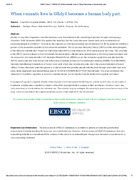| dc.contributor.author | Gathigia, M.G. | |
| dc.contributor.author | Ndung'u, R.W. | |
| dc.contributor.author | Orwenjo, D.O. | |
| dc.date.accessioned | 2016-02-04T08:24:48Z | |
| dc.date.available | 2016-02-04T08:24:48Z | |
| dc.date.issued | 2015 | |
| dc.identifier.uri | http://karuspace.karu.ac.ke/handle/20.500.12092/1887 | |
| dc.description.abstract | Studies in Cognitive Linguistics show that metaphors are fundamental to the structuring of people's thought and language (Sweetser 1990; Kövecses 2009). It is against this backdrop that this study discusses human body parts as metaphors of conceptualizing love in Gĩkũyũ.1 To achieve this objective, an interview schedule was administered to 48 respondents of different gender by the researcher assisted by four research assistants. The Conceptual Metaphor Theory (CMT) and the main principles of the Metaphor Identification Procedure Vrije Universiteit (MIPVU) (see Steen et al. 2010) were used in this study. The principles of the MIPVU were employed to find out whether the lexical items collected were metaphorical or not. Using three annotators and the researcher, the study identified 100 Metaphor Related Words (MRWs) as per the annotation guidelines adapted from the MIPVU procedures and three lexical units which were annotated as Discard From Metaphor Analysis (DFMA). From the MRWs, the study identified eight metaphors of human body parts which play an indispensable role in the conceptualization of love in Gĩkũyũ. Further, the study noted that gender is a vital variable that provides people with the prism through which they view love since males registered more lexical frequencies for LOVE IS A HUMAN BODY PART than females. The study concludes that metaphor in Cognitive Linguistics is not only a creative device, but an important mental facility and cognitive instrument. | en_US |
| dc.language.iso | en | en_US |
| dc.publisher | Cognitive Linguistic Studies | en_US |
| dc.subject | cognitive linguistics, metaphor, human body parts, love in Gikuyu | en_US |
| dc.title | When romantic love in Gĩkũyũ becomes a human body part | en_US |
| dc.type | Article | en_US |
